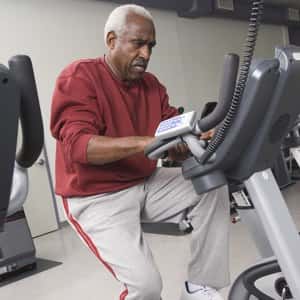
It’s no secret that exercise is good for your health. Research has shown that physical activity can help reduce the risk of dementia as well helping to control depression, diabetes and high blood pressure. Does it matter when you work out? Are you a morning person or do you prefer afternoon or evening for exercise? A new study suggests an evening workout may have some unique advantages (Diabetologia, May 19, 2021).
What Could an Evening Workout Do for You?
The scientists recruited 25 overweight Australian men between the ages of 30 and 45. To begin with, the researchers monitored their blood sugar, serum lipids, fitness and blood pressure for five days of a high-fat diet. (The researchers provided the meals as daily take-out, to maximize their control over the variables.) Then they assigned the volunteers randomly to exercise in the morning (6:30 am), the evening (6:30 pm) or not to exercise at all. After an additional six days, all the measures were repeated to see if any of them had changed.
Exercise in either morning or evening increased cardiorespiratory fitness and lowered insulin levels. But only those who exercised in the early evening improved their overnight blood sugar control. Evening exercisers also had lower insulin, triglycerides and LDL cholesterol.
The authors conclude that
“performing exercise in the afternoon or early evening may confer the greatest metabolic health benefits.”
What Kind of Exercise Were the Volunteers Doing?
The participants in this study used a stationary cycle (Lode Excalibur Sport) for each workout. Every other day, they did high-intensity training. In other words, they performed 10 one-minute bursts of cycling as hard as possible, separated by a minute of low-intensity exercise. In between, they did moderate-intensity exercise–40 minutes on day 7 and 60 minutes on day 9.
If you have access to a stationary cycle, you could follow a regimen like that. On the other hand, you don’t have to get on a cycle to be active. You could try swimming, tennis, dancing or any other form of movement you enjoy. Even people who walk benefit from the steps they take. Perhaps you should make a habit of an after-supper stroll at a moderate pace as your regular evening workout.
Citations
- Moholdt T et al, "The effect of morning vs evening exercise training on glycaemic control and serum metabolites in overweight/obese men: a randomised trial." Diabetologia, May 19, 2021. DOI https://doi.org/10.1007/s00125-021-05477-5

